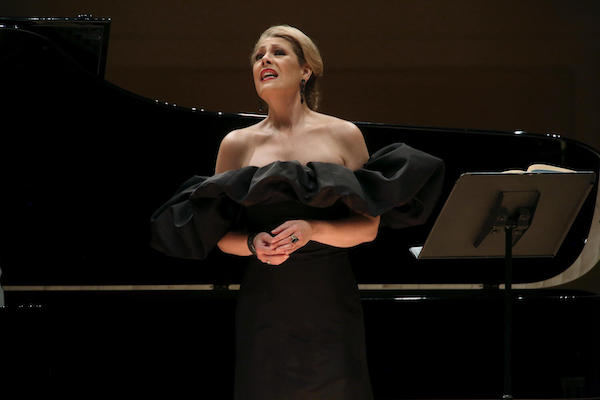Radvanovsky meditates on love and loss in personal Carnegie program
Sondra Radvanovsky’s Carnegie Hall recital on Wednesday evening could have been little more than a victory lap, coming on the heels of her recent triumph in Medea at the Metropolitan Opera.
But it wasn’t. Although she performed mostly standard repertoire that was sure to please her many fans, by interweaving narrative with song she charted a moving, highly personal journey which she entitled “From Loss to Love.”
Radvanovsky spoke to the audience throughout the recital. She explained that this year had been a difficult one for her due to both the death of her mother from Lewy Body Dementia and Parkinson’s disease, as well as the divorce from her husband and business manager, Duncan Lear. Song was one way that she could process her experience of love and loss, and so she did so, with a few tears along the way.
The recital opened with two Baroque arias, “When I am laid in earth” from Purcell’s Dido and Aeneas and “Piangero la sorte mia” from Handel’s Giulio Cesare in Egitto. Radvanovsky sang Dido’s Lament with dignity and restraint, except for her harrowing cries of “Remember me!”, later echoed in a white, ghostly tone.
The Handel aria was part of the soprano’s path to stardom, as she sang it in the first competition that she ever won. Sound of pure spun silver alternated with harshness as Cleopatra railed against her enemies. The delicate ornamentation with which Radvanovsky adorned Handel’s lovely melody that ends the aria made it all the more poignant.
In between chansons by Duparc, of which “Extase” was particularly moving, and Liszt’s Tre Sonetti di Petrarca, were songs by Rachmaninoff. The Duparc and Liszt songs provided Radvanovsky the opportunity to toss off high notes that bloomed at her command and her ability to infuse drama into her every utterance.
The Rachmaninoff songs resonated more deeply, however, as there was was a personal connection of loss. Radvanovsky told the audience that she was coached in the Russian songs with the late Dmitri Hvorostovsky, who was her artistic partner in opera, recital, and recordings.
The first of the songs, “Ne poj, krasavica, pri mne” was remarkable for the dramatic intensity which Radvanovsky brought to it. The control she exerted over the upper reaches of her range was phenomenal. Anguish with an almost unbearable intensity was expressed at full volume, while softer emotions unfolded in tones that were light and transparent. “Zdes’ khorosho,” which followed, found Radvanovsky in an almost trancelike state as she sang of nature and love. In this song, Radvanovsky was at her most radiant in both mood and voice.
Radvanovsky and Strauss are a perfect fit and these songs found her at her most expressive and connected to the text. “Befreit” suffered from some surprisingly awkward phrasing, but the singer’s extraordinary breath control was manifests in “Allerseelen” and “Morgen,” which were stunning. She ended with “Heimliche Aufforderung”, which was the glowing, rapturous exaltation of love that it must be.
The Italian songs by Verdi and Donaudy which followed were simple and lovely. Resting in the middle of her voice and containing gentler emotions, this was Radvanovsky at her most enchanting and vocally alluring. Donaudy’s “O del mio amato ben” was especially notable for its elegance and grace.
The emotional apex of the recital was the premiere of a new song by Jake Heggie to a poem by Radvanovsky entitled “If I Had Known”. It is intended to be the first in a cycle which charts the seven stages of dementia. The song undoubtedly owes a debt to Ricky Ian Gordon’s “I Never Knew” from the AIDS Quilt Songbook, but that doesn’t make it any less powerful.
Radvanovsky’s poem charts the regrets of one who witnessed a loved one slip away. Heggie’s simple, straightforward setting amplified the message in the way that only the combination of voice and piano can.
Pianist Anthony Manoli was more of an equal collaborator than an accompanist for Radvanovsky. He knows her voice intimately and is attuned to the dynamic and rhythmic nuances which she brings to the music she is performing. With songs by Liszt, Rachmaninoff and Strauss on the program, he had ample opportunity to impart his artistic stamp on the recital and so he did.
The concert ended with “La mamma, morta” from Giordano’s Andrea Chenier. In Radvanovsky’s mind’s eye, it was the perfect aria with which to end, as it was about one who had lost all, but could still find love. It also portends what is to come in her career as she assumes heavier roles, including Turandot in Zurich next year.
For encores, Radvanovsky sang two true diva turns, “Io son l’umile ancella” from Cilea’s Adriana Lecouvreur and “Vissi d’arte” from Puccini’s Tosca. She admitted that the latter was her favorite aria. The final song was in a lighter vein, and one which she said epitomized hope, Harold Arlen’s “Somewhere Over the Rainbow.”
Juan Diego Flórez performs at Carnegie Hall January 29, 2023. carnegiehall.org








Posted Nov 21, 2022 at 8:35 am by LORI SILVERBERG
PHENOMENAL CONCERT WITH TWO PERFECT PERFORMERS-what a brilliant concert and her Medea was divine!!!
Radnavosky sang like a wounded bird in perfect flight!! Manoli was concert pianist worthy – unlike most every accompanist!!